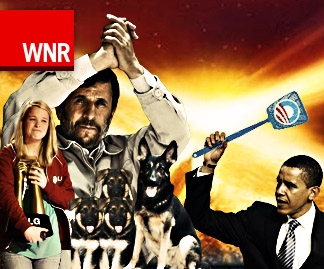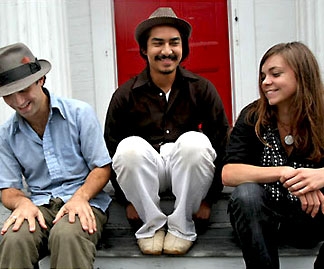Unless you’re a big music geek, you’ve probably never heard of The Replacements. Following the first wave of punk in the ’70s, the band burned through the ’80s, building up a strong (if cult) following, released a string of seven albums loved by critics and treasured by fans, and built a reputation as one of the best live bands on the planet. After hearing their records, Kurt Cobain mimicked their sloppy playing on Nirvana’s debut Bleach, Green Day‘s Billie Joe Armstrong picked up a guitar and Jeff Tweedy started Wilco. It’s been almost 20 years since The Replacements have played a note live, yet they continue to influence the influencers. The Gaslight Anthem’s Brian Fallon says his band “wouldn’t exist without The Replacements,” and The Hold Steady frontman Craig Finn credits The Replacements for the inspiration to start a band.
Yet most people have never heard of The Replacements. The bands from their time period that have lived on include Poison, Kiss and Van Halen. The Replacements had far better songs, but never “stuck” with that generation. As a music writer, I’ve been trying to quantify why some bands go on to define a generation, while other great bands fall away, remembered only by the hardcore fan. Sometimes, it’s easy to see why a band is remembered. Bob Dylan made a name for himself with songs protesting the Vietnam War and became the “voice” of the Baby Boomers, and Nirvana became the unofficial spokesperson Generation X after Cobain’s abrupt suicide.
But 2009 is a different era than Dylan’s 1969 or Cobain’s 1994. As music has gone from a product chosen and distributed by a few massive corporations to a mind-bogglingly large democracy (there are at least 6 million “artists” on MySpace), one of the effects is that large groups of people no longer have a common experience with music. Rather, our experiences are only shared by other niche fans.
Almost everyone who considered themselves a rock fan in the 1970s has memories around a few key albums, including Pink Floyd’s Dark Side of the Moon and The Who’s Quadrophenia. The famous line from the 1982 film Fast Times at Ridgemont High, “When it comes down to making out, whenever possible, put on side one of Led Zeppelin IV,” worked because an entire generation of teens knew which songs were on that side of the tape.
Today, that kind of pop culture reference doesn’t carry the same weight, because there are very few blockbuster albums of this generation. Even in the early 2000s, a “big” album could still sell 2 million albums in the first week, or occasionally even on release day (it was rare, but it happened). Today, only a handful of the biggest artists can hope for sales of that magnitude. Which means that there are very few albums that most of us have heard.
Statistically, I was born into the first year of “Generation Y” in 1982. When I fell in love with music in junior high in the late ’90s, I remember being a junior high kid trying to figure out what the high school kids were into. There were albums that most of them owned—Counting Crows August and Everything After, Nirvana’s Nevermind, Green Day’s Dookie, Tupac’s All Eyez On Me and Biggie’s Ready to Die album seemed to fill the cassette or CD player of almost every car in the high school parking lot.
But they were the tail end of Generation X. My generation (Y), may be the first without a few defining bands or albums that are remembered across the board or tied to an era. While the Internet’s power to turn music into a democracy where everyone has a voice has been a very positive thing, it may have killed my generation’s (statistically, those age 18-27) chance to have a few “big” albums to rally around.
Still, music consumption is at an all time high, so we’ll have to find some kind of common experience, right? From my years as a total music nerd, I’ve come up with a few criteria for how an artist or album comes to define a generation. They’ve got to “sound” like an era in pop culture without feeling dated (this is why Linkin Park will never define my generation, their new song for Transformers 2 already feels dated). Most of all, the artist has to be lucky enough or brilliant enough to put together a collection of songs that capture how a group of people are feeling at the time.
Green Day’s American Idiot probably isn’t the even their best album, let alone the best punk or protest record ever made. At best, it’s more like the rest of the music they’ve released throughout their career, in that most songs still contained only three or four chords. But I believe that album will live on, not necessarily because it was the best thing released in 2004, but because it was the right songs for the time. Billie Joe Armstrong took his for chords and his nasally whine, and found a way to say what everyone was feeling at the time, but couldn’t quite find words for.
The great part is, we may be the first generation to really pick. Every other generation had music marketed at them, and they more or less had to take it. The indie explosion of the last five years has happened because we have access to any band on the planet in three seconds or less with Google. The decision can no longer be made in a corporate boardroom by 50-year-olds guessing at what 18-year-olds will buy. Our generation’s albums that become classics are the ones we choose to lift above the relentless noise surrounding us.
So I leave it in your hands. What bands, and possibly albums, will define this phase of our lives. Not your favorite albums, but the songs that unite an increasingly fragmented culture of 18-27-year-olds. Which bands and albums define generation Y? Who has written, or is writing, our anthems that capture the experiences that are uniquely ours?
Seth “tower” Hurd, 26, can be heard on 89.7 Shine.FM in Chicago and 101.7 FUSE FM in Mid-Michigan.






















